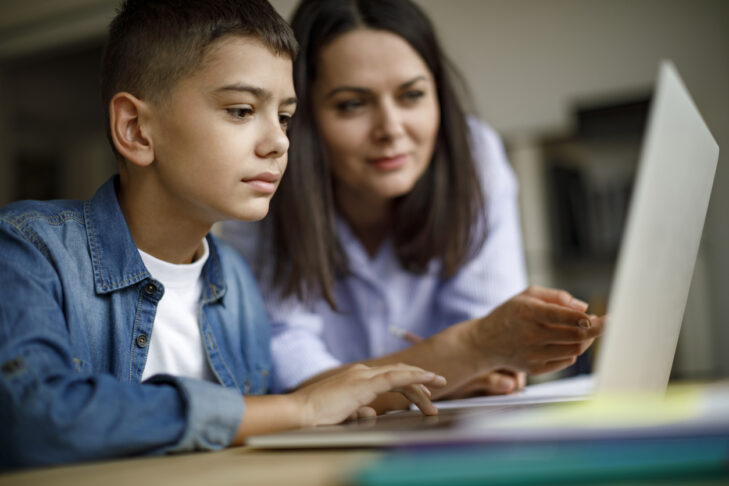Does your child want a new iPad? What about a Nintendo Switch? Maybe they simply spend hours with their eyes glazed over watching YouTube videos of kids opening boxes (yes, that’s apparently a thing). Never fear.
Recently, Dr. Michael Rich, associate professor of pediatrics at Harvard Medical School and a practitioner of adolescent medicine at Boston Children’s Hospital, gave a talk at The Rashi School titled, “Reclaiming Childhood From the River of Electronic Screens.” He talked to JewishBoston about how to do just that.
With Hanukkah coming up and kids getting gifts and possibly being in cars for a long time, what’s your stance on electronic media? Do you dole it out by age? By number of hours in a day? What’s appropriate?

We’re trying to reframe this from a “good and bad” space to rely on the scientific evidence, rather than on values-laden stuff. So, in fact, we don’t even use the word “appropriate.” We talk about “developmentally optimal,” because we’re looking at this as children develop physically, mentally, emotionally and spiritually. Their brains are capable of some things at different times; they’re more open to things at different times.
So, the first step is we try to find what the evidence shows us about what the brain is best capable of at each stage. And, as such, we look at these devices not as rewards for good behavior or punishments, but really as power tools. I use the phrase “power tool” quite intentionally, in a sense that we would never hand a power saw to a 4-year-old, but we think nothing of handing a smartphone to them. It should be provided to a child when they need its function and when we’re as confident as we can be that they can handle that function in ways that are safe, healthy and empathetic.
How do we ease them into using these tools?
We don’t toss the car keys to that same 4-year-old. We wait until they’re of an age, and then we sit next to them white-knuckled while they learn to drive. And I think we should take the same approach to the infinite access they are given with a smartphone, a tablet or a laptop.
It’s not just parents; it’s even schools that have been somewhat remiss in assuming that kids have the skills necessary both to use those tools effectively but also to be able to show their effect for themselves and others in that space. And it really is about that; it’s just like with driving, you want to understand that this tool gives you great freedom, will give you great reach, give you great capabilities, but it also gives you the opportunity to either intentionally or unintentionally harm yourself or others. We should be very thoughtful about when we introduce these tools but also introduce them in ways like a graduated driving license. Give the child a little bit of ability and see how she or he handles it. One size does not fit all.
How does a parent know when the time is right?
The most important thing is to recognize that you know your child better than anybody else, even though you sometimes feel like you don’t know her or him at all. But you do know your child. And I think the key thing is, especially when they’re starting off with a new device or application, to use it with them. I think we take an attitude in many cases that by virtue of the fact that these kids are more technically facile than we are, we could just sort of cut them loose with the technology. What they don’t have is the mature development of their prefrontal cortex where executive functions lie, and executive functions of the brain really are the air-traffic controller of the brain. So, it’s working memory, it’s impulse control, it’s future thinking, it’s understanding cause and effect. And the reality is, that part of our brain matures last. The visual cortex matures first, interestingly enough. So they’re perfectly able to see and navigate around a screen. What they don’t have is the checks and balances, if you will, on their behavior, which in fact won’t fully mature until they are in their mid to late 20s.
I think it’s really a matter of using these screens with your kids, even playing those video games you hate. But what ends up happening if you sit down and play “Call of Duty” or “Grand Theft Auto” is you’re showing them that you respect and care about what they like. You want to understand them. You will never be able to beat them, so you’re always going to be their student in that space. But then, when you finally figure out how to steal cars, you have the opportunity to say to them, “OK, I finally figured this out. Now, why would we want to do this over and over and over again?” You get to inject a little bit of that conscience, if you will.
I think one of the things we really have to do is parent them in the digital space just the way we do in physical space, which is where they’re spending more of their time, more of their waking attention. “Parent” is more importantly a verb than a noun, and we need to be in that space with them.
What about gifts? Is there a hard and fast rule you have?
Some kids are handed iPads in preschool, right? For schooling reasons, I think it’s really going to vary. But I would say, give it to them when they have a real need for that tool, not just when it’s entertainment. Many, many people put their 18-month-olds in front of an iPad and say, “Look how smart my baby is! He can make the cow picture go ‘moo!'” The reality is that every baby can do that. And, actually, what it proves is how smart Steve Jobs was in designing this really transparent interface between the human mind, eye, finger and thought.
What about bullying, which is so huge in social media these days? What’s your advice for monitoring that kind of issue?
Because kids don’t have that functional pre-frontal cortex, they’re not capable of understanding privacy the way you and I would understand it. They’re not capable of understanding they’re creating a permanent digital footprint for themselves that will be looked at by college admissions officers and by potential employers.
In fact, you may have heard the news: There was a group of acceptees to Harvard College who, after they were accepted and were headed for school, got involved in a back-and-forth on social media with some antisemitic stuff. They were denied admission; they withdrew their admissions. I’m saying, teach your child from the get-go to be authentic, to be their true selves.
And how does one do that?
I’m an eternal optimist as a pediatrician. I actually think social media, if we can learn to use it correctly, would be an instrumental piece. When kids are connecting around the world with kids in some other country, it’s going to be a whole lot harder for their political leaders to paint those people as enemies. I think if we use it and are true with it, true to ourselves with it, we will be able to be a truly global community. The problem is that we’re not using it that way yet; we as individuals are using it exactly the way companies use it. We are using social media to market ourselves to each other. We are posting the cool vacation we went on or the new car we got, or our hot boyfriend; even parents are showing off their children through it.
I think we lost a lot when “friend” became a verb. We are using social media to present these facades to each other. And yet, we have the expectation that it will be as sustaining and protective as true friendships. That disconnect really is what causes a lot of anxiety and depression, or contributes to anxiety and depression, particularly in those people who are on social media because they’re already socially anxious and feel awkward, and want to kind of keep a safe distance while they are establishing or even maintaining relationships.
How do parents navigate that dynamic?
I usually say to parents, first of all, don’t just hand these devices to kids. Wait until the kids ask for them. And when they ask for them, determine why they’re asking for them. Not just, “Because everyone else has one.” But, “What is your need for it?” And then, to have that discussion of, “Here’s how you’re going to use it. Here’s how you’re not going to use it and we will decide together those things, as well as what the consequences should be if you misuse it.”
And, of course, that evolves as they get older and more able to take care of things. But, frankly, this is an extension of the parenting we do anyway, which is as kids yearn for freedom, we give them a little bit of freedom, and we see how well they handle that responsibility.
If they handle it, they get more freedom. If they don’t handle it, you pull back and they get less. The process of parenting is really transferring discipline from an externally applied thing by parents to an internal structure in the kids’ self-discipline. And it is not a gradual or incremental process. It’s sort of like stair steps. They become more capable, and then they consolidate for a while. And then they become even more capable, and they consolidate for a while.
What’s the biggest takeaway for parents regarding how to know if their child is handling electronic media or not?
I think you start off by not giving them the privacy they crave. You say, “Look, I have access to your passwords; I actually have access to your accounts.” And here’s what really happens: No parent has all the time in the world to constantly monitor kids’ accounts. But it’s sort of like random drug-testing in the workplace, right? People change their behavior when they think that at any point in time they can be checked.
Also, keep the door open to your child to help them process stuff they are inevitably going to see and be confused by. Forty-two percent of 10- to 17-year-olds have ended up on porn sites. The average age of first exposure to pornography is 9 now, and it’s rapidly dropping because, as these kids get more facile with technology, they’re going to end up in places they will not really want to be. I think we have to be very conscious of human nature in this situation, and the most important thing is to keep that door open to communication with your kids. One of the real dangers with the values-laden “right and wrong” punishment aspect is that it will turn the internet into rock and roll in a sense that, “I like it all the much more because mom and dad don’t understand it and hate it.”
Kids need that; they need something that allows them to differentiate, allows them to be autonomous from their parents. That’s a key component of adolescent development. The important thing here is, just as we would let them drive a car, first drive with you in the front seat.



